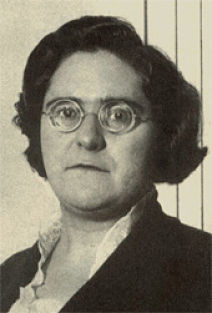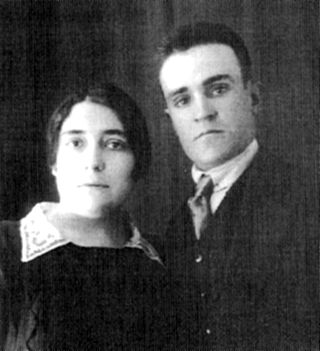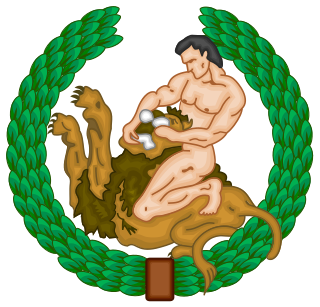
Frederica Montseny i Mañé was a Spanish anarchist and intellectual who served as Minister of Health and Social Assistance in the government of the Second Spanish Republic during the Civil War. She is known for being the first woman in Spanish history to be a cabinet minister and one of the first female ministers in Western Europe.
The Argentine Libertarian Federation is a libertarian communist federation which operates in Argentina,out of the City of Buenos Aires,San Pedro,La Pampa Province,and Rosario. Founded in October 1935 with the name of the Anarcho-Communist Federation of Argentina the FLA adopted its current name in 1955. It is governed by the Declaration of Principles and the Organic Charter approved by its congress. Its structure and operation are federative and are coordinated by Local Councils and the National Council.

Joan Peirói Belis was a Catalan anarchist activist,writer,editor of the anarchist newspaper Solidaridad Obrera,two-time General Secretary of the Confederación Nacional del Trabajo and Minister of Industry of the Spanish government during the Spanish Civil War.

Fermín Salvochea y Álvarez was a mayor of the city of Cádiz and a president of the province of Cádiz. He was one of the main propagators of anarchist thought in that area in the late 19th century and is considered to be "perhaps the most beloved figure in the Spanish Anarchist movement of the 19th century".

Joan Montseny i Carret (1864–1942),who also wrote under the pseudonym Federico Urales,was a Catalan anarchist activist and journalist from Spain.

Manuel Buenacasa Tomeo (1886–1964) was a Spanish militant anarchist,general secretary and chronicler of the Confederación Nacional del Trabajo (CNT) and Federación Anarquista Ibérica (FAI) trade unions.

María Bruguera Pérez was an anarcho-syndicalist who died in Madrid in 1992.
Saturnino Carod Lerín was an Aragonese anarchist politician and guerrilla. During the Spanish Civil War he commanded a militia column and later,during World War II he played an active role in the French Resistance.
Joan Puig i Elias (1898–1972) was a Catalan pedagogue and anarchist from Spain who continued the work of Francisco Ferrer. During the Spanish Civil War he was president of the New Unified School Council.

Josep Negre i Oliveras was a Valencian anarcho-syndicalist leader.
Ramón Álvarez Palomo was an Asturian anarcho-syndicalist and one of the key figures in the Revolution of 1934 and the establishment of the General Confederation of Labor.
Manuel Andreu Colomer (1889–1968) was a Catalan politician and trade unionist. As leader of the Barcelona electricians' union,he was a founding member of the Confederación Nacional del Trabajo (CNT). In 1915,he became editor of the CNT's newspaper Solidaridad Obrera and as was elected as the organisation's General Secretary. He was involved in a series of controversies during this time,due to his rejection of anarcho-syndicalism and recognition of minority nationalities in Spain,over which he was forced to resign his posts. He continued to participate in the restructuring of the CNT,successfully pushing for it to be organised along the lines of industrial unionism. By the time of the Second Spanish Republic,he had left the syndicalist movement and become a Catalan nationalist,serving in the Barcelona City Council as a member of AccióCatalana Republicana.
Pedro Herrera Camarero was a Spanish anarcho-syndicalist.
Josep Juan i Domènech was a Catalan anarcho-syndicalist.
Antonio Ejarque Pina was an Aragonese anarchist.

Juan Manuel Molina Mateo,also known as Juanel,was a Spanish anarcho-syndicalist militant of the National Confederation of Labor and a founding member of the Iberian Anarchist Federation.
The Spanish Libertarian Movement was a Spanish anarcho-syndicalist organization founded at the end of the Spanish Civil War by the CNT,the FAI and the FIJL to develop a joint clandestine activity in the interior of Spain,under the Francoist dictatorship,and legal activity in exile,where it dealt with the thousands of anarcho-syndicalist refugees in France. The MLE national council settled in Paris,with Germinal Esgleas acting as general secretary after the death of Mariano Rodríguez Vázquez on June 18,1939.

The Spanish Regional Federation of the International Workingmen's Association,known by its Spanish abbreviation FRE-AIT,was the Spanish chapter of the socialist working class organization commonly known today as the First International. The FRE-AIT was active between 1870 and 1881 and was influential not only in the labour movement of Spain,but also in the emerging global anarchist school of thought.

The General Secretary or Secretary General of the Confederación Nacional del Trabajo is the head of the Confederación Nacional del Trabajo,a Spanish confederation of anarcho-syndicalist trade unions. The position is elected by a congress or plenary session of the confederation. The position's powers are limited to technical and administrative affairs.
Esteve Conrad Francesc Pallarols Xirgu was a Catalan anarchist who became the first General Secretary of the CNT in clandestinity after the end of the Spanish Civil War. He organised the release of anarchist prisoners from Francoist concentration camps and their subsequent escape from Spain,for which he was executed by the Francoist authorities.









